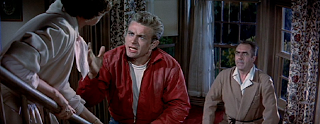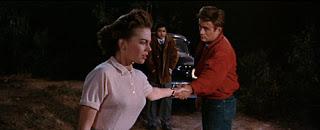
"You can wake up now, the universe has ended."
More than any other work, Rebel Without a Cause (1955) cemented our image of cinematic teenagers: confused but well-meaning, impulsive but loveable, fatally mixed-up. Nicholas Ray's melodrama still has an edge, despite its overwrought dramaturgy.Troubled teen Jim Stark (James Dean) arrives in Los Angeles with his smothering mom (Ann Doran) and wimpy dad (Jim Backus). In his first day at school, Jim falls in with a bad crowd, resulting in a knife fight and chicken run with local tough Buzz (Corey Allen). After an accident, Jim falls in with fellow wayward teens, Judy (Natalie Wood) and Plato (Sal Mineo). The trio want nothing more than human connection, but bullies and misunderstanding adults get in the way.
Besides making James Dean an icon, Rebel Without a Cause set the standard for the troubled teen genre. The same year's Blackboard Jungle couches its preachments in message picture terms: Glenn Ford's noble teacher is the hero navigating a racially mixed urban school. Ray and writer Stewart Stern relocate to suburban California, with middle class parents who offer their children everything but love.
Ray offers addled teens a simple excuse: adults are no damned good. Jim's parents spend all their time bickering, with his dad an apron-wearing wimp unable to stand up for himself. Judy hangs with hoods because her stern dad (William Hopper) thinks she's a tramp; Plato's implied to be gay, fawning over an Alan Ladd picture and primping for Jim, with his parents dead or absent. Teachers and cops don't care either; Jim befriends an amiable detective (Edward Platt) who disappears when he's needed most.
This aspect of Rebel hasn't aged well, offering easy explanations for deeper issues. Big dramatic scenes clunk, partly due to overacting: Jim's anguished "You're tearing me apart!" isn't less ridiculous than Tommy Wiseau's homage. The movie has the structure of a Greek tragedy, trapping the kids in predestined fates. The moment Plato's gun appears, we know a happy ending's impossible. No amount of good intentions or fleeting friendships can stave off doom.

Ray emphasizes this isolation with jarring touches; Jim navigating a crushing crowd of students or packed police station, decanted camera angles when Jim confronts his parents, red lights and jackets connoting isolation, the knife fight and car race unfolding at cliff side. Most striking is the class visit to the Planetarium, where an animated show reduces the awed kids to "passing figures in a godless Universe," insignificant and doomed. For a movie about cool teens, it's certainly downbeat.
James Dean cemented his immortality with this, his second major role after East of Eden. His poster boy looks and Method intensity overcome his awkward line readings; he's a striking sensual innocent, irresistible a generation, iconic for all time. Natalie Wood wrings anguish from her role, while Sal Mineo makes a tragic mope. None of the adults, save Edward Platt, transcend caricature, with the tough guys (Corey Allen, Dennis Hopper, Nick Adams) equally undeveloped.
Many films followed Rebel Without a Cause, from cheap exploitation movies to the feel good fuzziness of American Graffiti and Grease. Despite its clunkier touches, it endures as proof that even in Hollywood, the feel good '50s matched screen glamor with imponderable angst.

